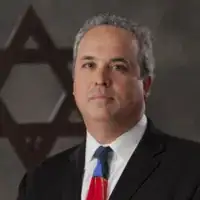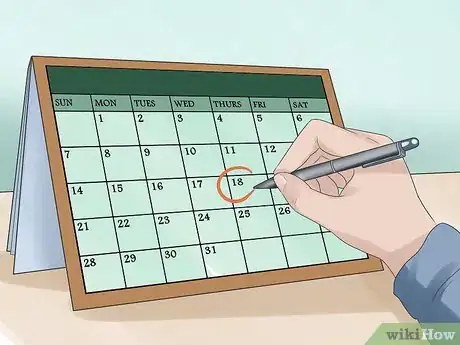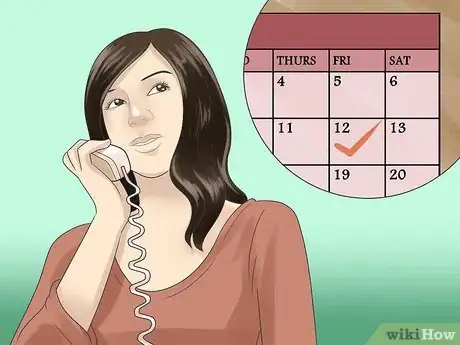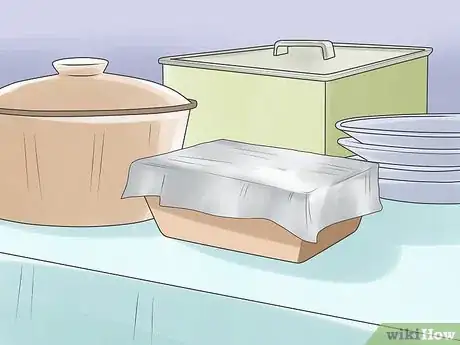This article was co-authored by David I. Jacobson. David I. Jacobson is the founder of Chicago Jewish Funerals, an independent Jewish owned funeral provider that evolved into two funeral homes in the Chicagoland area. With over 30 years of experience serving families, David is a leading expert on Kavod Hamet, the Jewish traditions of honoring and respecting the dead. David is an active funeral director that serves people planning and in need of funerals, lecturing to congregations, community groups, and schools extensively about the values of the Jewish funeral as well as the dying process and the value of one’s legacy.
There are 10 references cited in this article, which can be found at the bottom of the page.
wikiHow marks an article as reader-approved once it receives enough positive feedback. In this case, 100% of readers who voted found the article helpful, earning it our reader-approved status.
This article has been viewed 93,855 times.
Conducting a memorial service is a meaningful way to honor a person who has recently passed away. It is also a time for loved ones to remember the deceased, share their feelings with others, and seek comfort from other mourners. Unlike a funeral, the body of the deceased is not present at a memorial service, which creates additional flexibility in terms of timing and location.[1] This guide will help you plan and conduct the perfect memorial service to honor your loved one.
Steps
Making the Initial Arrangements
-
1Get help planning the memorial service.[2] The death of a loved one is a difficult time and planning a memorial service can be a daunting task. You don't have to go it alone! Enlist the help of friends and loved ones with the planning and preparations right from the beginning, and consider hiring outside help if needed.[3]
- Most houses of worship have people on staff who can give guidance in this process.
- Funeral directors will also help, but will charge for their services.
- For a very large memorial service, consider hiring an event planner to help run the show.
-
2Decide what kind of service you wish to have. A memorial service can take many forms and be as formal or informal as you like. Carefully consider the personality and wishes of the deceased, and the preferences of other family members when making your decision.[4] Pay particular attention to religious preference, as this is often the biggest factor in choosing the kind of service to conduct.[5]
- Traditional memorial services are usually more formal and somber in nature, and are frequently held in places of worship or funeral homes.
- Celebration of life gatherings tend to be less formal, and focus less on grieving and more on celebrating the memory of the deceased. Gatherings of this type can be held almost anywhere.
- Interment or sprinkling of ashes. If the deceased chose to be cremated, the memorial service is often held in conjunction with the interment or scattering of the ashes. The timing and location for this ceremony will depend on where the ashes will be placed.
Advertisement -
3Choose a location for the memorial service. If the service is to be religious in nature, a house of worship is an ideal choice. Funeral homes and banquet halls also work well for formal memorial services.[6]
- Memorial services can also be held at the cemetery or crematorium, even after the interment has taken place.
- Consider holding a celebration of life service at a favorite place of the deceased. This could include a restaurant, park, or even a bowling alley.
- An ash sprinkling ceremony will take place outdoors, usually at a favorite place of the deceased. Many people choose to scatter ashes into the ocean or other body of water, or at a location with a beautiful view.[7]
-
4Schedule a date and time for the memorial service. Confer with the loved ones of the deceased to choose a day and time when everyone can attend. Remember to keep the needs of out-of-town guests in mind when making your choice. It is generally preferable to schedule the service on a weekend or in the evening to maximize the number of people who can attend.[8]
- If the service is to be held outdoors, consider planning for a time when good weather is likely to occur.
- If the service will be held in a remote location, give people adequate time to make travel arrangements.
-
5Make any necessary reservations. For most indoor locations, reservations are a must. If you are planning to hold your service at a public park, you may also need reservations or a permit, depending on the size of the service.
- You may also need to rent chairs, a podium, sound system, etc. These can all be reserved through a local event rental company.
-
6Send out notifications of the date, time and location the service. This should be done as soon as possible. You can send out at additional details later as they arise.[9]
- Personal phone calls are generally considered the most appropriate way to notify family members and close friends.
- Place a notice in the obituary section of the local newspaper. If an obituary has not yet been published, you can do this at the same time.
- Emails and social media are also good ways to get the word out about the service, and keep people updated of any changes.
- Be sure to notify current and former coworkers of the deceased who might wish to attend.
- Be prepared to provide lodging and transportation suggestions for out-of-town guests.
Planning the Actual Service
-
1Choose an officiant to lead the service. In the case of formal memorial services, this is most often a religious leader or a funeral director. For less formal services where everyone is invited to speak and share stories, it is still advisable to choose a family member or friend to serve as the master of ceremonies.
- If the officiant will be writing a eulogy, be sure that he or she has all of the information needed to make it personalized and meaningful, and don't be shy about asking to see a draft before it is delivered.
- State very clearly to the officiant what you have in mind for the service, and be firm with any requests to include or leave out certain material, etc.
- When choosing an emcee, look for a person who is energetic and good at drawing people out. Many mourners get shy at memorial services and have trouble speaking, but a good emcee will be encouraging and able to help people find their voice.
- If you plan to ask guests to share stories, readings, etc., let them know ahead of time and give them time to prepare.
-
2Select readings for the service. It is common to read favorite poems, passages from religious texts, and even the writings of the deceased in a memorial service. Decide on the readings that you wish to include, and on who will read them, or invite guests to bring favorite passages with them to share at the ceremony.[10]
- Think of friends and loved ones you can specifically invite to deliver readings. Many people who might be too shy to volunteer would be happy to participate if asked.
- It is a nice touch to include a copy of any prearranged readings in a handout for guests to follow along with, or to display them on a Power Point slide.
-
3Select music for the service. Not all memorial services include music, but many do. The music should fit the type of service your are holding, but should also reflect the tastes of the deceased and the talents of friends and loved ones. Even a formal service can be concluded with a rousing rendition of the deceased's favorite jazz standard or rock anthem.[11]
- Enlist or hire any musicians you might need as soon as you have a date to work with.
- Consider asking those closest to the deceased to make suggestions for music to play at the service.
- Remember to arrange for any sound equipment you might need. A portable stereo will work, but depending on the size and nature of the event, this might be the time to go all out and rent some professional speakers or even hire a DJ.
- Creating and distributing mix-CDs of the music played at the service can be a meaningful memento of the deceased.
-
4Create a commemorative photo display or slide-show. It is common to display photographs of the deceased before and during a memorial service. Consider bringing a large portrait of the deceased to display, or creating a photo display board. You may also ask guests to bring favorite photos of the deceased to share, or to send image files to include in a PowerPoint slide show.[12]
- Helping to create a memorial slide show or video is a great way for friends and family members feel included.
-
5Arrange to have flowers or other decorations at the service. If something is preferred in lieu of flowers, such as making contributions to a favored charity or memorial fund, make sure to include this information when announcing the memorial service to guests.[13]
-
6Prepare a memorial service program to give to guests. Most memorial service programs include a photo and biographical information about the deceased, and information about the service. Many also include inspirational quotes, the text of any shared readings, information about surviving relatives, etc.
- You can find free templates on-line to create and print your own program at home, or you can have them done up professionally.
-
7Provide a guestbook for people to sign. You might also encourage people to include phone numbers or other contact information so that relatives who have lost touch can reconnect.[14]
-
8Add personal touches to service wherever possible. The best memorial services really capture the spirit and personality of the deceased. If the deceased was known for wearing zany ties or Hawaiian shirts, encourage guests to do the same. If the deceased had a sweet tooth, provide personalized candy favors for the guests. Use your imagination, the possibilities are endless!
Planning the Reception
-
1Plan to provide refreshments after the service. Light refreshments should be provided at the memorial service even if an off-site reception will also be taking place. Refreshments might include coffee, cookies and juice, or something more elaborate. Having refreshments on hand will encourage people to linger and talk, and continue remembering the deceased in a more relaxed setting.[15]
-
2Choose the type of reception you wish to have. A post-memorial reception can take many forms, from a potluck at the home of a nearby relative, to a raucous after-party at the favorite bar of the deceased.[16]
-
3Choose a location for the reception. The reception should take place fairly near the location of the memorial service. Make any necessary reservations ahead of time, and prepare maps or clear directions to the reception site to distribute to guests at the memorial service.
-
4Make arrangements for food and drink. If the reception will be a potluck, be sure to notify guests ahead of time and try to coordinate dishes. Hiring a caterer for the reception is another option that is often less stressful on the family of the deceased.[17]
-
5Assign or hire someone to be in charge of managing the refreshments and the reception. If at all possible, delegate this task to a friend or associate who will not mind missing the memorial service to ensure that the refreshments are in place and kept stocked, and that the reception venue is in order.
-
6Allow sufficient travel time to the reception site. Allow for at least a half an hour between the end of the memorial service and the beginning of the reception to allow people time to rest, freshen up, and change clothes if they would like.
- If the reception will be an adults-only event, consider helping to arrange childcare for any parents who would like to attend.
Expert Q&A
Did you know you can get expert answers for this article?
Unlock expert answers by supporting wikiHow
-
QuestionHow can you reduce the cost of a memorial service?
 David I. JacobsonDavid I. Jacobson is the founder of Chicago Jewish Funerals, an independent Jewish owned funeral provider that evolved into two funeral homes in the Chicagoland area. With over 30 years of experience serving families, David is a leading expert on Kavod Hamet, the Jewish traditions of honoring and respecting the dead. David is an active funeral director that serves people planning and in need of funerals, lecturing to congregations, community groups, and schools extensively about the values of the Jewish funeral as well as the dying process and the value of one’s legacy.
David I. JacobsonDavid I. Jacobson is the founder of Chicago Jewish Funerals, an independent Jewish owned funeral provider that evolved into two funeral homes in the Chicagoland area. With over 30 years of experience serving families, David is a leading expert on Kavod Hamet, the Jewish traditions of honoring and respecting the dead. David is an active funeral director that serves people planning and in need of funerals, lecturing to congregations, community groups, and schools extensively about the values of the Jewish funeral as well as the dying process and the value of one’s legacy.
Funeral Home Director Everybody may have a different opinion on what's expensive and what's not expensive, but it's important that you get everything you want at a fair price so that when you walk away, you know that you were served really well. In order to get the best value for what you are paying for, understand exactly what you want and try to work with somebody who can help you achieve that.
Everybody may have a different opinion on what's expensive and what's not expensive, but it's important that you get everything you want at a fair price so that when you walk away, you know that you were served really well. In order to get the best value for what you are paying for, understand exactly what you want and try to work with somebody who can help you achieve that. -
QuestionWhat is the difference between a funeral service and a memorial service?
 David I. JacobsonDavid I. Jacobson is the founder of Chicago Jewish Funerals, an independent Jewish owned funeral provider that evolved into two funeral homes in the Chicagoland area. With over 30 years of experience serving families, David is a leading expert on Kavod Hamet, the Jewish traditions of honoring and respecting the dead. David is an active funeral director that serves people planning and in need of funerals, lecturing to congregations, community groups, and schools extensively about the values of the Jewish funeral as well as the dying process and the value of one’s legacy.
David I. JacobsonDavid I. Jacobson is the founder of Chicago Jewish Funerals, an independent Jewish owned funeral provider that evolved into two funeral homes in the Chicagoland area. With over 30 years of experience serving families, David is a leading expert on Kavod Hamet, the Jewish traditions of honoring and respecting the dead. David is an active funeral director that serves people planning and in need of funerals, lecturing to congregations, community groups, and schools extensively about the values of the Jewish funeral as well as the dying process and the value of one’s legacy.
Funeral Home Director
-
QuestionWhat should you talk about in a memorial speech?
 David I. JacobsonDavid I. Jacobson is the founder of Chicago Jewish Funerals, an independent Jewish owned funeral provider that evolved into two funeral homes in the Chicagoland area. With over 30 years of experience serving families, David is a leading expert on Kavod Hamet, the Jewish traditions of honoring and respecting the dead. David is an active funeral director that serves people planning and in need of funerals, lecturing to congregations, community groups, and schools extensively about the values of the Jewish funeral as well as the dying process and the value of one’s legacy.
David I. JacobsonDavid I. Jacobson is the founder of Chicago Jewish Funerals, an independent Jewish owned funeral provider that evolved into two funeral homes in the Chicagoland area. With over 30 years of experience serving families, David is a leading expert on Kavod Hamet, the Jewish traditions of honoring and respecting the dead. David is an active funeral director that serves people planning and in need of funerals, lecturing to congregations, community groups, and schools extensively about the values of the Jewish funeral as well as the dying process and the value of one’s legacy.
Funeral Home Director
References
- ↑ https://www.funeralhelpcenter.com/funeral-vs-memorial-service-whats-the-difference/
- ↑ David I. Jacobson. Funeral Home Director. Expert Interview. 14 July 2020.
- ↑ https://www.youtube.com/watch?v=UWyLQ99hkfw
- ↑ David I. Jacobson. Funeral Home Director. Expert Interview. 14 July 2020.
- ↑ https://www.loveliveson.com/an-ultimate-guide-to-5-types-of-funeral-ceremonies/
- ↑ https://www.everplans.com/articles/all-you-need-to-know-about-memorial-services
- ↑ http://www.us-funerals.com/ash-scattering.html#.VICu8NLF808
- ↑ https://funerals.org/?consumers=planning-memorial-service
- ↑ https://funerals.org/?consumers=planning-memorial-service
- ↑ https://www.beliefnet.com/wellness/health/health-support/grief-and-loss/2000/11/composing-a-memorial-service-from-beginning-to-end.aspx
- ↑ https://www.beliefnet.com/wellness/health/health-support/grief-and-loss/2000/11/composing-a-memorial-service-from-beginning-to-end.aspx
- ↑ https://funerals.org/?consumers=planning-memorial-service
- ↑ https://funerals.org/?consumers=planning-memorial-service
- ↑ https://funerals.org/?consumers=planning-memorial-service
- ↑ https://www.funeralwise.com/plan/celebration-of-life/funeral-food/
- ↑ https://www.funeralwise.com/plan/celebration-of-life/reception/
- ↑ https://www.funeralwise.com/plan/celebration-of-life/reception/


















































































